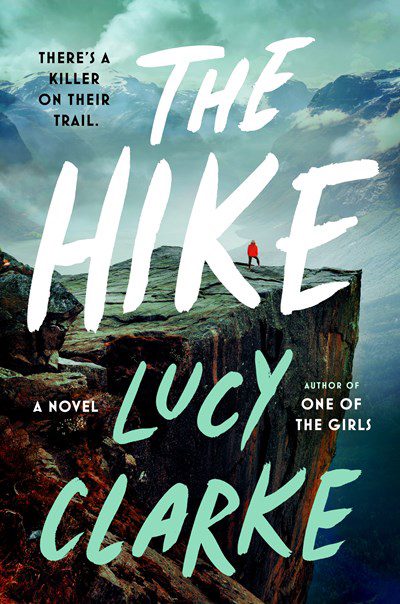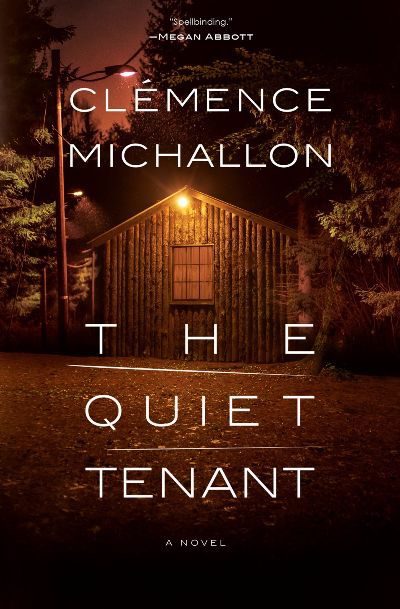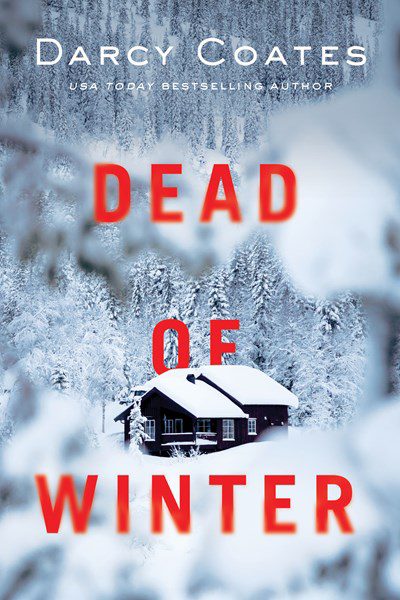A near-perfect novel of utopia-gone-wrong. Liz and her three female friends take a vacation together every year, typically somewhere with plenty of sun and a good bartender. But this year it’s Liz’s turn to pick, and needing a radical reset, she decides they’ll go mountain climbing in the gorgeous wilds of Norway. Gorgeous, but deadly. And—as the locals point out, not a climb for the inexperienced—which is all of them. Here’s a bit of what could go wrong: creepy, predatory males spying on them; killer storms; mud slides; loss of all provisions; no cell phone reception; and interference from a drug cartel. In addition, each woman manages to screw things up in her own way, like losing the trail or spraining an ankle, regularly setting them at one another’s throats. The novel builds slowly, we get plenty of insight into each woman’s personal life and the baggage she hopes to leave on the mountain, while the suspense blossoms beautifully. Richly atmospheric, well-plotted, with plenty of insight into female friendship, this should appeal to fans of Lisa Unger and Claire Douglas.
Review
Two couples—Lucy and Adam, Cora and Scott—are the best of friends. It helps that, with the exception of Lucy, they were flatmates as far back as university. They’re in and out of one another’s houses, share care for the children, and have even purchased a beach house together, spending the weekends collectively renovating it. So when Lucy is at a work party and a colleague shares photos of her honeymoon in the Maldives, she’s shocked to see Scott in one of the photos, clearly with another woman. What is going on? Adam tells her to drop it—who knows what she really saw in the photo?—but Lucy is like a dog with a bone. Her investigation of Scott’s life opens up layers of deceit, causing Adam, and then Scott, to launch an aggressive campaign to gaslight her. Eventually Lucy realizes that she isn’t crazy but that everyone in her life knows far more about Scott, and the mystery woman in the photograph, than she does. For readers who love domestic suspense that doesn’t shy away from well-developed characters; large, complex plots; and plenty of dialogue. For fans of Lisa Unger and Rachel Hawkins.
“Before I got this job,” says Jennica Jungstedt, “I had no idea how far people are willing to stretch the limits of their values,” neatly summing up the theme of this Swedish psychological drama. Jennica is a psychic-hotline operator, but really more of a therapist for those who call; she’s also dating a much-older professor, Steven Rytter. He seems almost too good to be true when they get together after meeting on an online-dating site. “Don’t want to jinx it,” she tells her friends, “but right now it’s going pretty fucking great.” Not so great is that Steven has a wife, Regina, who’s been struck down by the mysterious after-affects of a virus He also forbids his house cleaner, Karla, the only outside contact Regina has, from talking to the sick woman. Karla, meanwhile, has a new space as a lodger in a home that’s equally dysfunctional: she lives with a recent widower who might soon lose his home as he’s unemployed and the bills are mounting. There are lots of characters here, each with a distinct personality and a unique way of adding to the spiraling chaos. Starring two young women, Jennica and Karla, this book is both lighter than many of the Scandi noir titles of recent years and more devastating in portraying the characters’ slow, then all too rapid, descent into murder. A must read.
Small towns in cozies tend to center on sumptuous bakeries, homey libraries, and kind neighbors. Walsh and his characters aren’t here for that. Instead, they kick you upright to witness the rot that can set in when greed, fear, and both too much and too little hope clash in a small community. The story here focuses on the titular character, a member of a Kinlough, Ireland posse of teens who make fast, cutting judgements—some startlingly accurate—about those around them. Those judgements and their attendant goings-on follow the group over decades. Except for Kala, that is, because she goes missing as a teen, an event that’s explored through flashbacks to that hormone-and-sunshine-filled time and in the present, when one of the gang returns to Kinlough for a wedding and Kala’s disappearance becomes a focal point once more. This is far more Stuart Neville than Maeve Binchy, and includes both graphic descriptions of animal abuse and child abuse that happen off the page, but if you can stomach those scenes, you’re in for a memorable tale with not a word wasted. Side note: until I checked, I thought this was written by an Irish woman, as my days as an all-girls’-school-schoolgirl in rural Ireland were that faithfully reproduced (hand me the smelling salts whenever you get a chance).
After a stint as an advertising executive in New York City, Mallory is back in Wingate, Connecticut, where she has taken over her recently deceased aunt’s Cookie Shop. Finally, a long-held dream fulfilled. Except Mallory’s staff of two can’t stop rankling each other, her boyfriend is seen in a compromising situation with another woman, and food blogger Beatrice Wright, aka Queen Bea, is accusing her of stealing a recipe. Then Beatrice is discovered dead, lying on her kitchen floor, her body outlined by flour. And who might have discovered the body? Our heroine, Mallory–who had stopped by Beatrice’s house to make cookie peace. While this novel uses many of the tropes of cozy fiction, there’s a wonderful freshness about Mallory, who can’t wait to let others solve the murder, and confronts all likely suspects herself, in a direct and unvarnished manner. The first in a series that many cozy readers will love. One request: it’s time for Kip, Mallory’s BFF and fellow baker, to come out. Everyone seems to have a love life, while he’s left at home making spaghetti for Mallory and loading up the Netflix. Sad.
Do you look at Britain’s sleazy, salacious and exploitative tabloid culture and wonder: how do they get away with this? If so, this is the book for you. Set in the fictitious The Daily Voice, “the country’s top-selling newspaper”–it’s a whole lot like the real Daily Mail– the narrative alternates between tough-as-nails Stella, just a step away from being editor in chief, and newbie Jess, in from the country with, of all things, ideals. The “trade off” refers to the practice of exchanging one thing, say photographs of a naked leading man being led about on a dog leash, for what the tabloid really wants: a front page interview with him about his failed marriage. When this sort of celebrity manipulation goes awry–the beloved winner of a cooking show is hounded until she kills herself–Stella miraculously finds her much-dented moral compass and reluctantly pairs up with Jess. Inspired by #metoo, the two manage to dismantle the toxic misogyny and sexual harassment that’s at the center of The Daily Voice. Both characters have wonderful voices, and when you’re not cringing in horror you’ll be laughing aloud.
How does Stacey Abrams do it all? Last year, she ran for Governor of Georgia while maintaining her voting-rights activism and apparently writing this book. The second in the Avery Keene duology (after While Justice Sleeps) sees Supreme Court clerk Keene back in the lawyer/amateur detective seat. As the book opens, she’s being grilled by Congress about allegations she’s brought to light regarding corruption and crimes by disgraced President Brandon Stokes. Readers won’t help but imagine him as having a certain orange hue, and it seems no coincidence that his initials are BS. Other parts of the book seem taken from current headlines, too, enriching an exciting tale of blackmailing of federal judges and imminent nationwide technological sabotage that seems all too possible. At the heart of it are Keene’s smarts, eidetic memory, and integrity—this is a woman who’s underestimated at her foes’ peril, and there’s plenty of peril. Details of the inner workings of Washington, DC are strewn throughout the work and raise the interest level even further. For a mini-course in political intrigue, try this and James Comey’s Central Park West, which is out later in May.
Think you’ve made mistakes in your life? Meet Gabe Angueira, who had a rocky time growing up as one of the few Puerto Ricans in Louisville, Kentucky, but has found success as a landlord of multiple properties around the city. He’s divorced—alcohol played a big role with both spouses—but now is living with his ex-wife, Anya, maintaining a kind of truce as they care for their daughter, who’s in a minimally conscious state since she crashed her car, drunk. Gabe’s just trying to get by when he meets a mom who seems to be in the same boat. She’s close to tears when she shows up to see Anya’s for-rent house; she just wants to help her daughter, who’s pregnant and desperate. But Gabe doesn’t have a rental agreement with him when he shows her the property, and on her part, she doesn’t have a check for the deposit. Never mind, thinks Gabe, he’ll pick it up later. Readers can feel a disaster looming, but will in no way be ready for the catastrophe that unfolds…and unfolds..and explodes. This is a gripping, emotional, and adrenaline-filled ride all the way through. I can’t wait for more from this debut author.
Did you like Emma Donoughue’s Room? French journalist Michallon’s debut (written in English as a challenge to herself) is for you. Trapped in a garden shed for years is Rachel—well, that’s the name her captor has given her–who’s chained to the floor, fed barely enough, and kept in mortal fear. “I won’t be happy” is her captor’s threat that keeps her in line, and maintaining his brittle composure is her daily struggle. She knows she’s next to his home where he has the life she longs for, with freedom and family. Suddenly, she gets the chance to partake in it, and maybe to escape—but is it all a trick? At the same time, we meet her captor, Aidan, in the outside world, where he’s barely recognizable as a monster who keeps a sex slave. He and his teenage daughter, Cecilia, are the focus of community sympathy and help following the recent death, from cancer, of Aidan’s young wife. The women are the stars of this book, and their inner lives and relationships will draw readers in from page one. “Rachel” obviously takes the central role, with Michallon doing a superb job of portraying her as a well-rounded character who lives in one room, her hopes, memories, and agonies doing the heavy lifting. But there’s also Cecilia, a girl we get to know intimately as she flounders in her grief and tries to make tentative forays outside her father’s strict control, and Emily, a woman who gets to know Aidan in the outside world and shows us a side of him, and of this kind of crime, that’s unexpected and compelling. Psychological drama at its best; the ending had me literally sitting forward, propelling the women on.
Have we been holding back on the raw carnage? If so, this book will more than make up for that. It’s winter, and Christa, our narrator, and her boyfriend, Kiernan, join a tour group of eight headed to a splendid lodge in the Rocky Mountains. But en route the weather turns nasty, a huge pine tree blocks their road, and they are forced to seek shelter in an abandoned hunting cabin as the snow piles up. Alarm bells ringing yet? The plot is squarely in the tradition of locked-room mysteries, more often locked mansions or islands these days, and we can expect our eight participants to slowly get bumped off thanks to poison, asphyxiation, or other genteel means. Well, that’s half correct. For most of the novel, the characters are locked in, thanks to the storm, unable to stray much beyond the cabin. But death in this novel is anything but genteel. In fact, it’s downright terrifying. But even more disturbing is Christa’s plight; obsessively assessing her peers to determine whom, if anyone, she can trust. Coates is also a horror author, and there’s a good dollop of that genre woven through this novel of high suspense. Keep a cat or two on your lap when reading this one.










